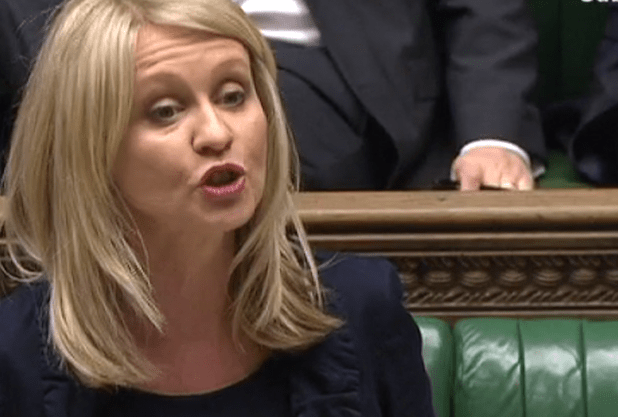Today’s Work and Pensions Questions was taken almost exclusively by Esther McVey – to the extent that when Steve Webb finally got the chance to answer a question, he joked that he had started to ‘feel unemployed’ while waiting for his big moment. Even Iain Duncan Smith only got one good stint at the despatch box, when Rachel Reeves asked him about the progress of Universal Credit. But the rest of the session was McVey Question Time.
Tory MPs are naturally in a tribal mood at the moment, and so all most of them want to talk about was the jobs fairs they’re all holding in their constituencies. ‘I organised a jobs fair’ has become the second most important phrase for a Tory MP to use after ‘long-term economic plan’, with bonus points for an MP who asks a question about their jobs fair that enables a ministerial answer involving the words ‘long-term economic plan’, as Philip Davies managed to do today. McVey played along, but had so many questions to answer that at one point she ended up on the wrong page in her notes, and muttered ‘Oops-a-daisy!’ as she hurriedly flicked to the right section.
The minister’s notes have become particularly important of late, as she has taken to offering a potted life history of certain backbenchers who ask questions, such as ‘my right honourable friend was born in a cardboard box, pulled himself up by his bootstraps, founded his own business and now organises jobs fairs as part of our long-term economic plan, so he knows about the value of hard work!’ Today it was Margot James’s turn. She asked about the Enterprise Allowance, and said this support had been ‘essential to the thriving business environment’. McVey replied:
‘My honourable friend is right. When any new business sets up, it needs support, it needs mentoring, it needs an access to finance and all of those things that we’re doing. And the honourable lady knows exactly how to set up a business, she’s set up her own and won awards for it, and, from the background that she’s from, her dad set up his own business in the 1930s that went on to be an incredibly successful manufacturing company! That is the sort of thing we need to do, we need to support people, access to finance and a good business plan and I’d like to thank the honourable lady for raising that question.’
James must have been impressed that McVey had been so assiduous in researching her family tree before the session. But what was less impressive was the Labour attack.
Rachel Reeves has a poor reputation for media performances, but is actually very good in the Chamber, putting Iain Duncan Smith under a great deal of pressure over Universal Credit and other benefit cuts even though welfare is a tricky issue for her party. She’s often very witty, too.
But today she asked for a guarantee that the Work and Pensions Secretary would meet his latest target for Universal Credit, pointed out that at the current pace it would take 1,571 years to complete the reform, and then let IDS reel off a long list of Labour failures. The Secretary of State also dismissed Reeves’ attack as probably looking better on paper than it sounded in the Chamber – and today it did. The minister then pressed Labour on whether it would drop Universal Credit if it came into government later this year.
Pressure from the government benches rather than scrutiny from the opposition benches is never a good look, particularly not this close to an election. Reeves’ colleagues on the Labour benches didn’t back her up with supplementary questions about Universal Credit, and her frontbench colleagues asked about other things, so the lasting impression from the session was not one of DWP chaos, but of Tory jobs fairs.







Comments